BUS 172
Citrus College
Page 3 out of 32 results
Sort by
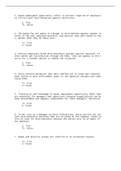
-
Citrus College BUS 172 Chapter 3|Complete Guide A+
- Exam (elaborations) • 22 pages • 2023
- Available in package deal
-
- $9.49
- + learn more
1. Equal employment opportunity refers to actions required of employers to correct past discrimination against minorities. a. True *b. False 2. The Equal Pay Act makes it illegal to discriminate against people in terms of the pay, employee benefits, and pension they earn based on the ir gender when they do equal work. *a. True b. False 3. Several employees filed discrimination charges against ValuTech. If they cannot get satisfaction through the EEOC, they can appeal to the c ourts fo...
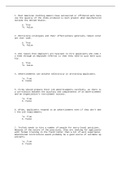
-
Citrus College BUS 172 Chapter 5|Complete Guide A+
- Exam (elaborations) • 20 pages • 2023
- Available in package deal
-
- $9.49
- + learn more
1. If employees consistently achieve their productivity objectives, it might be a signal that training is needed. a. True *b. False 2. Training is oriented toward broadening employees' individual skills for future responsibilities. a. True *b. False 3. By far the greatest proportion of training is spent on rank-and-file employees and their supervisors. *a. True b. False 4. The systematic approach to training involves needs assessment, progr am design, implementation, and evaluation...
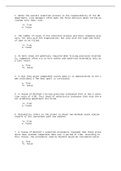
-
Citrus College BUS 172 Chapter 6|Complete Guide A+
- Exam (elaborations) • 25 pages • 2023
- Available in package deal
-
- $9.49
- + learn more
1. While the overall selection process is the responsibility of the HR department, line managers often make the final decision about hiring pe rsonnel into their unit. *a. True b. False 2. The number of steps in the selection process and their sequence will vary, not only with the organization, but also with the type and level of jobs to be filled. *a. True b. False 3. As more steps are generally required when filling positions external ly, companies often try to hire within and adver...
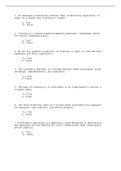
-
Citrus College BUS 172 Chapter 7|Complete Guide A+
- Exam (elaborations) • 20 pages • 2023
- Available in package deal
-
- $9.49
- + learn more
1. If employees consistently achieve their productivity objectives, it might be a signal that training is needed. a. True *b. False 2. Training is oriented toward broadening employees' individual skills for future responsibilities. a. True *b. False 3. By far the greatest proportion of training is spent on rank-and-file employees and their supervisors. *a. True b. False 4. The systematic approach to training involves needs assessment, progr am design, implementation, and evaluation...
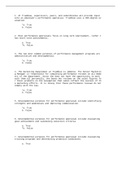
-
Citrus College BUS 172 Chapter 8|Complete Guide A+
- Exam (elaborations) • 24 pages • 2023
- Available in package deal
-
- $9.49
- + learn more
1. At TrueBlue, supervisors, peers, and subordinates all provide input into an employee's performance appraisal. TrueBlue uses a 360-degree ev aluation. *a. True b. False 2. Most performance appraisals focus on long-term improvement, rather t han short-term achievements. a. True *b. False 3. The two most common purposes of performance management programs are administrative and developmental. *a. True b. False 4. The marketing department at TrueBlue is immense. The Senior Marketin ...
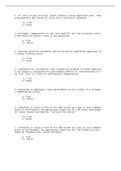
-
Citrus College BUS 172 Chapter 9|Complete Guide A+
- Exam (elaborations) • 27 pages • 2023
- Available in package deal
-
- $9.49
- + learn more
1. If rates of pay are high, which creates a large applicant pool, then organizations may choose to raise their selection standards. *a. True b. False 2. Strategic compensation is the term used for all the processes used t o determine the market rates to pay employees. a. True *b. False 3. Raising selection standards and hiring better-qualified employees ca n reduce training costs. *a. True b. False 4. LennoCorp has introduced a new recognition program in which employee s are public...
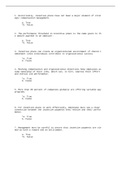
-
Citrus College BUS 172 Chapter 10|Complete Guide A+
- Exam (elaborations) • 21 pages • 2023
- Available in package deal
-
- $9.49
- + learn more
1. Historically, incentive plans have not been a major element of strat egic compensation management. a. True *b. False 2. The performance threshold in incentive plans is the name given to th e amount awarded to an employer. a. True *b. False 3. Incentive plans can create an organizational environment of shared c ommitment since individuals contribute to organizational success. *a. True b. False 4. Meshing compensation and organizational objectives help employees as sume ownership o...
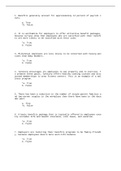
-
Citrus College BUS 172 Chapter 11|Complete Guide A+
- Exam (elaborations) • 24 pages • 2023
- Available in package deal
-
- $9.49
- + learn more
1. Benefits generally account for approximately 14 percent of payroll c osts. a. True *b. False 2. It is worthwhile for employers to offer attractive benefit packages, because surveys show that employees who are satisfied with their benefi ts are more likely to be satisfied with their jobs. *a. True b. False 3. Millennial employees are less likely to be concerned with having pen sions than Baby Boomers. *a. True b. False 4. TynsCorp encourages its employees to eat properly and to ex...
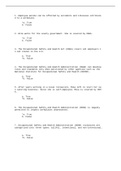
-
Citrus College BUS 172 Chapter 1 2Complete Guide A+
- Exam (elaborations) • 22 pages • 2023
- Available in package deal
-
- $9.49
- + learn more
1. Employee morale can be affected by accidents and illnesses attribute d to a workplace. *a. True b. False 2. Ella works for the county government. She is covered by OSHA. *a. True b. False 3. The Occupational Safety and Health Act (OSHA) covers all employers i n all states in the U.S. a. True *b. False 4. The Occupational Safety and Health Administration (OSHA) can develop rules and standards only when petitioned by other agencies such as the National Institute for Occupational Sa...
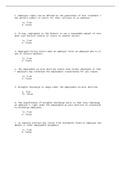
-
Citrus College BUS 172 Chapter 13|Complete Guide A+
- Exam (elaborations) • 24 pages • 2023
- Available in package deal
-
- $9.49
- + learn more
1. Employee rights can be defined as the guarantees of fair treatment t hat workers expect in return for their services to an employer. *a. True b. False 2. In law, negligence is the failure to use a reasonable amount of care when such failure results in injury to another person. *a. True b. False 3. Negligent hiring occurs when an employer hires an employee who is pr one to violent behavior. *a. True b. False 4. The employment-at-will doctrine states that either employees or thei r...

How did he do that? By selling his study resources on Stuvia. Try it yourself! Discover all about earning on Stuvia


